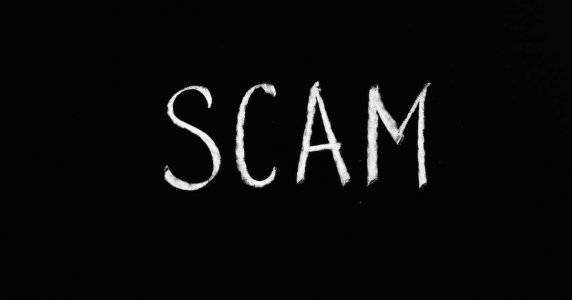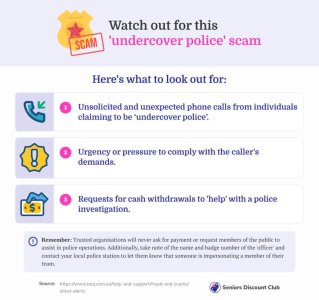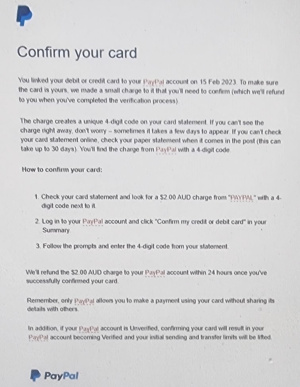Stay alert! You could be the next victim of a new Bank of Queensland scam targeting seniors
- Replies 20
As cybercriminals become increasingly sophisticated and more aggressive in their fraudulent activities, it is now more important than ever to stay vigilant and protect yourself from scammers.
In relation to this, the Bank of Queensland has issued a warning against a scam that’s been making rounds online and is said to target Australian seniors.
The Bank of Queensland is urging Australians to stay alert.
According to the bank, they have received ‘an influx of reports’ claiming that their customers have been scammed by criminals posing as undercover police officers. They said that these scammers have been requesting customers to make cash withdrawals from their accounts.
This ‘undercover police officer’ scam involves the criminal claiming that they are police officers who are trying to stop a hacker from stealing the customer’s money.
‘The callers are targeting the elderly and vulnerable, claiming that the police are working on an operation to stop a hacker inside of BOQ from stealing your money. They introduce themselves with an alias, badge/staff number and fake reference number,’ the bank explained in a statement.
To enhance their credibility, the scammer will claim that no money will be lost permanently since it will be ‘re-deposited later’. Then, another party will pretend to be a staff member of the bank to gather personal details from the victim, including addresses.
‘These callers coach you into withdrawing cash from a BOQ branch and provide a cover story (e.g., travelling overseas, work done on the house, and terminal illness-related bills),’ they shared.
According to the bank, cybercriminals will create layers of information and fabricate scenarios and identities of individuals to create the illusion of a sophisticated undercover operation.
‘After acquiring the cash, the scammers visit your address with a duffle bag to collect the cash and then disappear.’
Bank of Queensland’s Customer Advocate Ben Griffin stated: ‘We are urging Australians to keep a look out for unexpected phone calls from individuals claiming to be ‘undercover police officers’ and to not give in to the pressure they often put on their victims to comply with their demands.’
He added that ‘trusted organisations’ such as the police or the bank themselves will never ask for payment or for members of the public to ‘assist in police operations’.
‘If you are called by someone you believe is suspicious, take note of the name and badge number of the officer and contact your local police station,’ he explained.
He added: ‘Too often we hear from customers who wanted to question a suspicious interaction but were unsure whom to talk to.’ Mr Griffin also urged customers to ask questions or speak to a trusted family member, a friend, or the bank to prove if calls or claims are legitimate.
‘We’re highly trained and here to help,’ he said.
Mr Griffin previously warned that in online scams, once criminals have gotten a hold of your money, they will immediately transfer these funds to offshore cryptocurrency accounts. This makes it impossible for banks to retrieve lost funds. His statement comes after a scammer swindled a man out of his entire life savings in a matter of minutes. You can read more details about this story here.
To protect yourself, BOQ has advised the following:
To report a fraud or scam, visit your local branch or call Bank of Queensland’s hotline on 1300 55 72 72 (Monday-Friday, 8 AM to 8 PM AEDT, and Saturday, 9 AM to 5 PM AEDT).
Moreover, the bank said that if you have any concerns about the legitimacy of correspondence or individuals who are contacting you, you may contact them directly via email ([email protected]) or using the details found on their ‘Contact Us’ page.
Lastly, you can report a cybercrime or cyber security incident to the ACSC via ReportCyber at https://www.cyber.gov.au/acsc/report or call the Australian Cyber Security Hotline on 1300 CYBER! (1300 292 371).

What are your thoughts on this story? Were you aware of this scam? Let us know in the comments! Remember, stay vigilant, and keep yourself safe!
In relation to this, the Bank of Queensland has issued a warning against a scam that’s been making rounds online and is said to target Australian seniors.
The Bank of Queensland is urging Australians to stay alert.
According to the bank, they have received ‘an influx of reports’ claiming that their customers have been scammed by criminals posing as undercover police officers. They said that these scammers have been requesting customers to make cash withdrawals from their accounts.
This ‘undercover police officer’ scam involves the criminal claiming that they are police officers who are trying to stop a hacker from stealing the customer’s money.
‘The callers are targeting the elderly and vulnerable, claiming that the police are working on an operation to stop a hacker inside of BOQ from stealing your money. They introduce themselves with an alias, badge/staff number and fake reference number,’ the bank explained in a statement.
To enhance their credibility, the scammer will claim that no money will be lost permanently since it will be ‘re-deposited later’. Then, another party will pretend to be a staff member of the bank to gather personal details from the victim, including addresses.
‘These callers coach you into withdrawing cash from a BOQ branch and provide a cover story (e.g., travelling overseas, work done on the house, and terminal illness-related bills),’ they shared.
According to the bank, cybercriminals will create layers of information and fabricate scenarios and identities of individuals to create the illusion of a sophisticated undercover operation.
‘After acquiring the cash, the scammers visit your address with a duffle bag to collect the cash and then disappear.’
Bank of Queensland’s Customer Advocate Ben Griffin stated: ‘We are urging Australians to keep a look out for unexpected phone calls from individuals claiming to be ‘undercover police officers’ and to not give in to the pressure they often put on their victims to comply with their demands.’
He added that ‘trusted organisations’ such as the police or the bank themselves will never ask for payment or for members of the public to ‘assist in police operations’.
‘If you are called by someone you believe is suspicious, take note of the name and badge number of the officer and contact your local police station,’ he explained.
He added: ‘Too often we hear from customers who wanted to question a suspicious interaction but were unsure whom to talk to.’ Mr Griffin also urged customers to ask questions or speak to a trusted family member, a friend, or the bank to prove if calls or claims are legitimate.
‘We’re highly trained and here to help,’ he said.
Mr Griffin previously warned that in online scams, once criminals have gotten a hold of your money, they will immediately transfer these funds to offshore cryptocurrency accounts. This makes it impossible for banks to retrieve lost funds. His statement comes after a scammer swindled a man out of his entire life savings in a matter of minutes. You can read more details about this story here.
To protect yourself, BOQ has advised the following:
- Do not disclose personal information in an unsolicited or unexpected phone call.
- Never send or give money to someone you haven’t met in person.
- End the phone call if the caller is threatening or forcing you to do something (like withdraw cash).
- If you’re feeling unsure, speak to a trusted family member, friend or your bank.
To report a fraud or scam, visit your local branch or call Bank of Queensland’s hotline on 1300 55 72 72 (Monday-Friday, 8 AM to 8 PM AEDT, and Saturday, 9 AM to 5 PM AEDT).
Moreover, the bank said that if you have any concerns about the legitimacy of correspondence or individuals who are contacting you, you may contact them directly via email ([email protected]) or using the details found on their ‘Contact Us’ page.
Lastly, you can report a cybercrime or cyber security incident to the ACSC via ReportCyber at https://www.cyber.gov.au/acsc/report or call the Australian Cyber Security Hotline on 1300 CYBER! (1300 292 371).
Key Takeaways
- The Bank of Queensland is warning Australians about a new scam involving callers pretending to be representatives of undercover police officers.
- The scammer typically introduces themselves with an alias, badge or staff number and fake reference number and instructs victims to withdraw cash.
- BOQ says the scammers target vulnerable Australians, especially the elderly and vulnerable persons, and pressure them to comply with their demands.
- To protect yourself, BOQ advises not to disclose personal information in unsolicited calls, not to send or give money to someone you haven’t met, to end calls if the caller is threatening, and to contact BOQ if you have any concerns.











